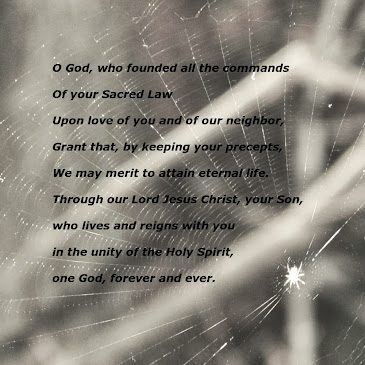“See that you not be deceived,
for many will come in my name, saying,
‘I am he,’ and ‘The time has come.’
Do not follow them!
When you hear of wars and insurrections,
do not be terrified; for such things must happen first,
but it will not immediately be the end.”
W hen I was a boy, I somehow acquired a pocket-sized New Testament. I remember walking home from school one day, reading Apocalypse. I was fascinated like schoolboys of countless generations with Saint John's signs and symbols. I knew little of politics in those days; there was no 24/7 news cycle to trouble my days and nights with anxiety. If anything worried me, it was a playground bully or tomorrow's math test. But who remembers yesterday's troubles? They never compare with today's real worries!
Revelation provides great fun for the young imagination. Apocalyptic imagery comes at children today through comic books, videos, and computer games. I suppose young adults fabricate these mindless AI fantasies, providing epic heroes like Thor, Zeus, and Sauron to their juniors, unaware of their ancient mythological origins and their archetypal meaning. As they grow, the children will dabble in gothic and macabre imagery -- I consumed Edgar Allen Poe's poems and short stories. We can hope they finally discover Shakespeare, Austin, Goethe, and Dostoevsky, to help them understand themselves in our complex adult world.
But as adults we still need the Bible's Apocalypse to be reminded, "See that you not be deceived;" and "Do not be terrified." Even adults can be confused and anxious by the sheer scope of the world's violence and suffering. The news business -- which is given to entertainment rather than informing -- discovered long ago that consumers buy more stuff when they're anxious. And scary, confusing stories arouse more apocalyptic anxiety than feel-good shaggy dog stories.
Christian apocalyptic, unlike the garish imagery of today's pagan apocalypse, reassures the faithful. Its message is simple and consistent, "Jesus Christ has triumphed over sin and death. You have nothing to fear." It gives us stories of a young virgin who bears a child and swaddles her firstborn son and lays him in a manger, even as angels announce the Good News to shepherds, and magi travel from afar to see the wonder.
When evil appears in the story, a dragon disgorging a flood to destroy her, the earth opens its mouth to swallow it while Michael and his angels deliver her to a safe place. Christian apocalyptic draws us away from this world's spectacles and encourages us to wait on the Lord and walk in his Way.
Just as God transforms deicide into hope, Christian apocalyptic repurposes this world's horror and gives us joy.

No comments:
Post a Comment
I love to write. This blog helps me to meditate on the Word of God, and I hope to make some contribution to our contemplations of God's Mighty Works.
Ordinarily, I write these reflections two or three weeks in advance of their publication. I do not intend to comment on current events.
I understand many people prefer gender-neutral references to "God." I don't disagree with them but find that language impersonal, unappealing and tasteless. When I refer to "God" I think of the One whom Jesus called "Abba" and "Father", and I would not attempt to improve on Jesus' language.
You're welcome to add a thought or raise a question.